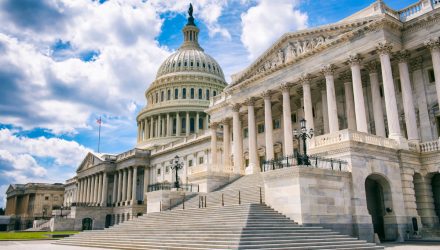Democrats continue to work to pass a $2 trillion package on climate, healthcare, and education through the House that includes creating universal pre-kindergarten for three- and four year-olds, subsidizing child care costs and healthcare, encouraging carbon emission reduction through incentives, and also raising taxes on the wealthy and on foreign profits made by companies, reports the Wall Street Journal.
Proposals in the tax increase include raising the corporate tax rate to 26% from 21% and raising the marginal income tax rate from 37% to 39.6% for individuals that make over $400,000 a year. There is also a proposal to add a 3% surcharge to income greater than $2.5 million for individuals or $5 million for those married filing jointly, according to Dividend.com.
The important part for investors is that the administration is aiming at raising the top marginal tax rate on long-term capital gains to 25%, up from its current 20%. Dividends are also set to experience a marginal rate increase as well.
Even if taxes were left untouched by the Biden Administration, capital gains are getting primed to rise already. The Tax Cuts and Jobs Act of 2017 that reduced tax rates across the board, including capital gains thresholds, included an important clause relating to inflation that would trigger once certain inflationary parameters were met, once again changing the numbers to reflect inflation. In short, with inflation rising, capital tax gains could be increasing anyway.
In these environments, ETFs become invaluable because they typically do not generate capital gains because of their creation and redemption mechanisms; an exception to this are fixed-income ETFs, which often have creations and redemptions based in cash. ETFs trade “in kind,” meaning that they trade just as a stock would, with baskets that contain the underlying holdings of the ETF. Mutual funds must raise cash when selling securities to pay out to the investor, garnering capital gains.
Add into this efficiency the benefits of active management and the ability of ETFs to closely mirror mutual funds, and it becomes clear that ETFs can be a great solution for investors in a rising tax environment, particularly one that is concerned with long-term inflation and instability that it might cause.
Active management firm T. Rowe Price offers eight different actively managed ETFs, many of which use the same strategies as their mutual fund counterparts and are overseen by the same portfolio manager on both the ETF and mutual fund sides.
The firm brings a bevy of experience and research to its products, with portfolio managers averaging over 20 years in investing each, as well as over 400 investment professionals dedicated to researching companies within ETFs.
For more news, information, and strategy, visit the Active ETF Channel.








